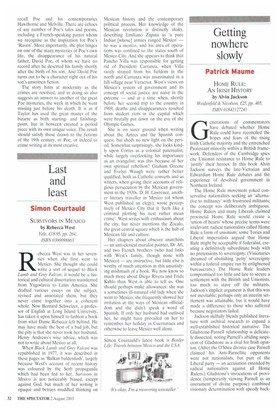Last and least
Simon Courtauld
SURVIVORS IN MEXICO by Rebecca West Yale, £18.95, pp. 264, ISBN 0300098863 Rebecca West was in her seventies when she first went to Mexico. She thought she could write a sort of sequel to Black Lamb and Grey Falcon; it would be a historical and cultural dissertation transferred from Yugoslavia to Latin America. She drafted various essays on the subject, revised and annotated them, but they never came together into a coherent whole. Now Bernard Schweizer, a professor of English at Long Island University, has taken it upon himself to fashion a book from what Dame Rebecca left behind. He may have made the best of a bad job, but the pity is that she never took her husband, Henry Andrews's wise advice, which was not to write about Mexico at all.
When Black Lamb and Grey Falcon was republished in 1977, it was described in these pages as 'Balkan balderdash', largely because West's account of recent history was coloured by the Serb propaganda which had been fed to her. Survivors in Mexico is not noticeably biased, except against God, but much of her writing is opaque and betrays muddled thinking on Mexican history and the contemporary political process. Her knowledge of the Mexican revolution is distinctly shaky, describing Emiliano Zapata as 'a pure Indian [whose] armies ranged Mexico' — he was a mestizo, and his area of operations was confined to the states south of Mexico City. And she appears to think that Pancho Villa was responsible for getting rid of President Carranza, when Villa rarely strayed from his fiefdom in the north and Carranza was assassinated in a hill village near Veracruz. West's views on Mexico's system of government and its concept of social justice are naive in the extreme — and at a time when, shortly before her second trip to the country in 1969, deaths and disappearances resulted from student riots in the capital which were brutally put down on the eve of the Olympic Games.
She is on surer ground when writing about the Aztecs and the Spanish conquest, but sheds no new light on the period. Somewhat surprisingly, she looks kindly upon Cortes as a colonial paternalist, while largely overlooking his importance as an evangelist; was this because of her own spiritual rebellion? Graham Greene and Evelyn Waugh were rather better qualified, both as Catholic converts and as writers, when giving their accounts of religious persecution by the Mexican government in the 1930s. D. H. Lawrence, another literary traveller in Mexico (of whom West published an elegy), wrote perceptively of Mexico City that it 'feels like a criminal plotting his next rather mean crime'. West writes with enthusiasm about the city, but never mentions the Zocalo, the great central square which is the hub of Mexican life and culture.
Her chapters about obscure anarchists — an anti-clerical muralist painter, Dr Atl, and two French brothers (who had links with West's family, though none with Mexico) — are instructive, but little else is worthy of much attention in this unsatisfying mishmash of a book. We now know so much more about Diego Rivera and Frida Kahlo than West is able to tell us. One should perhaps make allowances: she was a sometimes ill-natured old lady when she went to Mexico, she frequently showed her irritation at the ways of Mexican officialdom and she didn't speak a word of Spanish. If only her husband had outlived her, he might have prevailed on her to remember her holiday in Cuernavaca and otherwise to leave Mexico well alone.


























































 Previous page
Previous page